
simplechat
Secure AI conversations with documents, video, audio, and more. Personal workspaces for focused context, group spaces for shared insight. Classify docs, reuse prompts, and extend with modular features.
Stars: 81
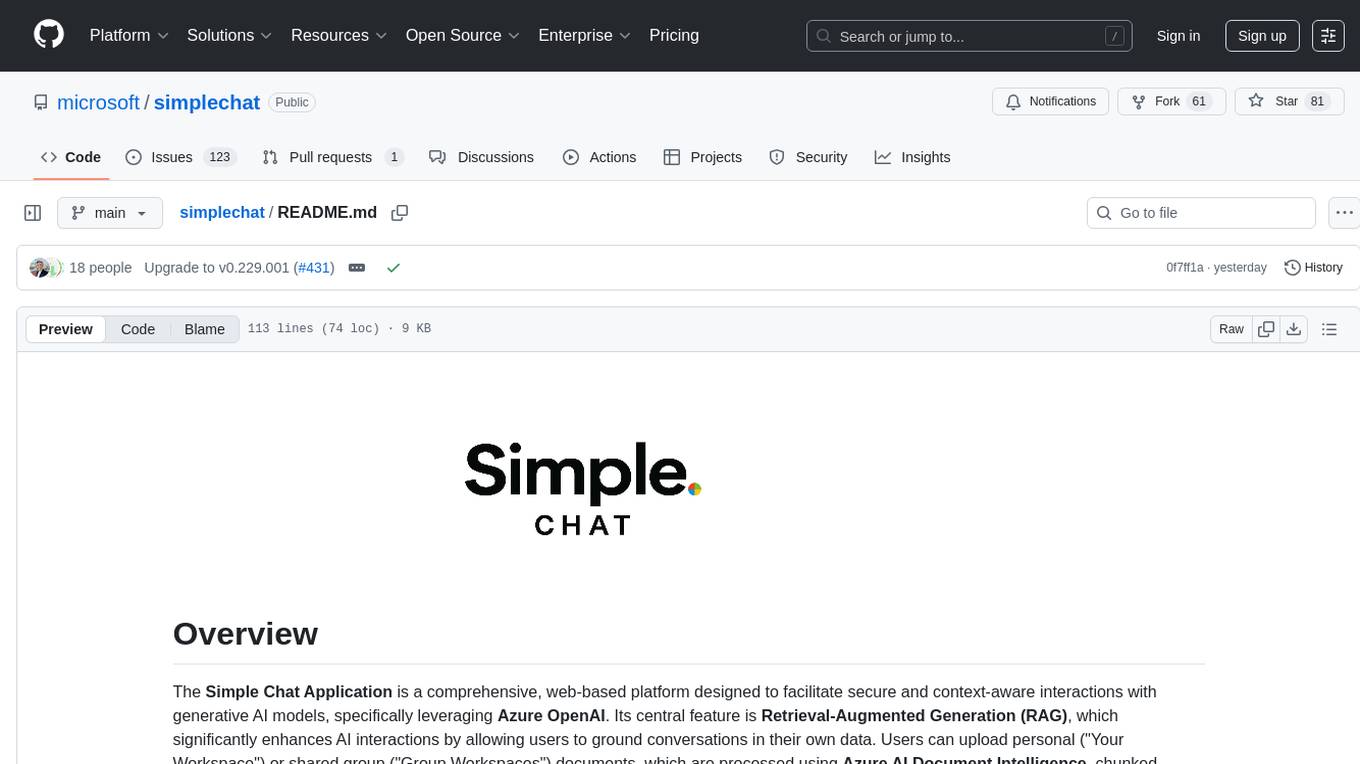
The Simple Chat Application is a web-based platform that facilitates secure interactions with generative AI models, leveraging Azure OpenAI. It features Retrieval-Augmented Generation (RAG) for grounding conversations in user data. Users can upload personal or group documents processed using Azure AI Document Intelligence and Azure OpenAI Embeddings. The application offers optional features like Content Safety, Image Generation, Video and Audio processing, Document Classification, User Feedback, Conversation Archiving, Metadata Extraction, and Enhanced Citations. It uses Azure Cosmos DB for storage, Azure Active Directory for authentication, and runs on Azure App Service. Suitable for enterprise use, it supports knowledge discovery, content generation, and collaborative AI tasks in a secure, Azure-native framework.
README:
The Simple Chat Application is a comprehensive, web-based platform designed to facilitate secure and context-aware interactions with generative AI models, specifically leveraging Azure OpenAI. Its central feature is Retrieval-Augmented Generation (RAG), which significantly enhances AI interactions by allowing users to ground conversations in their own data. Users can upload personal ("Your Workspace") or shared group ("Group Workspaces") documents, which are processed using Azure AI Document Intelligence, chunked intelligently based on content type, vectorized via Azure OpenAI Embeddings, and indexed into Azure AI Search for efficient hybrid retrieval (semantic + keyword).
Built with modularity in mind, the application offers a suite of powerful optional features that can be enabled via administrative settings. These include integrating Azure AI Content Safety for governance, providing Image Generation capabilities (DALL-E), processing Video (via Azure Video Indexer) and Audio (via Azure Speech Service) files for RAG, implementing Document Classification schemes, collecting User Feedback, enabling Conversation Archiving for compliance, extracting AI-driven Metadata, and offering Enhanced Citations linked directly to source documents stored in Azure Storage.
The application utilizes Azure Cosmos DB for storing conversations, metadata, and settings, and is secured using Azure Active Directory (Entra ID) for authentication and fine-grained Role-Based Access Control (RBAC) via App Roles. Designed for enterprise use, it runs reliably on Azure App Service and supports deployment in both Azure Commercial and Azure Government cloud environments, offering a versatile tool for knowledge discovery, content generation, and collaborative AI-powered tasks within a secure, customizable, and Azure-native framework.
-
Chat with AI: Interact with an AI model based on Azure OpenAI’s GPT models.
-
RAG with Hybrid Search: Upload documents and perform hybrid searches (vector + keyword), retrieving relevant information from your files to augment AI responses.
-
Document Management: Upload, store, and manage multiple versions of documents—personal ("Your Workspace") or group-level ("Group Workspaces").
-
Group Management: Create and join groups to share access to group-specific documents, enabling collaboration with Role-Based Access Control (RBAC).
-
Ephemeral (Single-Convo) Documents: Upload temporary documents available only during the current chat session, without persistent storage in Azure AI Search.
-
Conversation Archiving (Optional): Retain copies of user conversations—even after deletion from the UI—in a dedicated Cosmos DB container for audit, compliance, or legal requirements.
-
Content Safety (Optional): Integrate Azure AI Content Safety to review every user message before it reaches AI models, search indexes, or image generation services. Enforce custom filters and compliance policies, with an optional
SafetyAdminrole for viewing violations. -
Feedback System (Optional): Allow users to rate AI responses (thumbs up/down) and provide contextual comments on negative feedback. Includes user and admin dashboards, governed by an optional
FeedbackAdminrole. -
Bing Web Search (Optional): Augment AI responses with live Bing search results, providing up-to-date information. Configurable via Admin Settings.
-
Image Generation (Optional): Enable on-demand image creation using Azure OpenAI's DALL-E models, controlled via Admin Settings.
-
Video Extraction (Optional): Utilize Azure Video Indexer to transcribe speech and perform Optical Character Recognition (OCR) on video frames. Segments are timestamp-chunked for precise retrieval and enhanced citations linking back to the video timecode.
-
Audio Extraction (Optional): Leverage Azure Speech Service to transcribe audio files into timestamped text chunks, making audio content searchable and enabling enhanced citations linked to audio timecodes.
-
Document Classification (Optional): Admins define custom classification types and associated colors. Users tag uploaded documents with these labels, which flow through to AI conversations, providing lineage and insight into data sensitivity or type.
-
Enhanced Citation (Optional): Store processed, chunked files in Azure Storage (organized into user- and document-scoped folders). Display interactive citations in the UI—showing page numbers or timestamps—that link directly to the source document preview.
-
Metadata Extraction (Optional): Apply an AI model (configurable GPT model via Admin Settings) to automatically generate keywords, two-sentence summaries, and infer author/date for uploaded documents. Allows manual override for richer search context.
-
File Processing Logs (Optional): Enable verbose logging for all ingestion pipelines (workspaces and ephemeral chat uploads) to aid in debugging, monitoring, and auditing file processing steps.
-
Redis Cache (Optional): Integrate Azure Cache for Redis to provide a distributed, high-performance session store. This enables true horizontal scaling and high availability by decoupling user sessions from individual app instances.
-
Authentication & RBAC: Secure access via Azure Active Directory (Entra ID) using MSAL. Supports Managed Identities for Azure service authentication, group-based controls, and custom application roles (
Admin,User,CreateGroup,SafetyAdmin,FeedbackAdmin). -
Backend Services:
- Azure Cosmos DB: Stores conversations, document metadata, user/group information, settings, and optionally archived chats and feedback.
- Azure AI Search: Powers efficient hybrid search and retrieval over personal and group documents.
- Azure AI Document Intelligence: Extracts text, layout, and structured data from PDFs, Office files, images, and more during ingestion.
- Azure Cache for Redis: (Optional) Provides a distributed cache for session data, enabling seamless scaling and improved reliability.
-
Supported File Types:
- Text:
txt,md,html,json
- Documents:
pdf,docx,pptx,xlsx,xls,csv - Images:
jpg,jpeg,png,bmp,tiff,tif,heif(processed via Document Intelligence OCR) - Video:
mp4,mov,avi,wmv,mkv,webm(requires Video Indexer) - Audio:
mp3,wav,ogg,aac,flac,m4a(requires Speech Service)
- Text:
For Tasks:
Click tags to check more tools for each tasksFor Jobs:
Alternative AI tools for simplechat
Similar Open Source Tools

simplechat
The Simple Chat Application is a web-based platform that facilitates secure interactions with generative AI models, leveraging Azure OpenAI. It features Retrieval-Augmented Generation (RAG) for grounding conversations in user data. Users can upload personal or group documents processed using Azure AI Document Intelligence and Azure OpenAI Embeddings. The application offers optional features like Content Safety, Image Generation, Video and Audio processing, Document Classification, User Feedback, Conversation Archiving, Metadata Extraction, and Enhanced Citations. It uses Azure Cosmos DB for storage, Azure Active Directory for authentication, and runs on Azure App Service. Suitable for enterprise use, it supports knowledge discovery, content generation, and collaborative AI tasks in a secure, Azure-native framework.
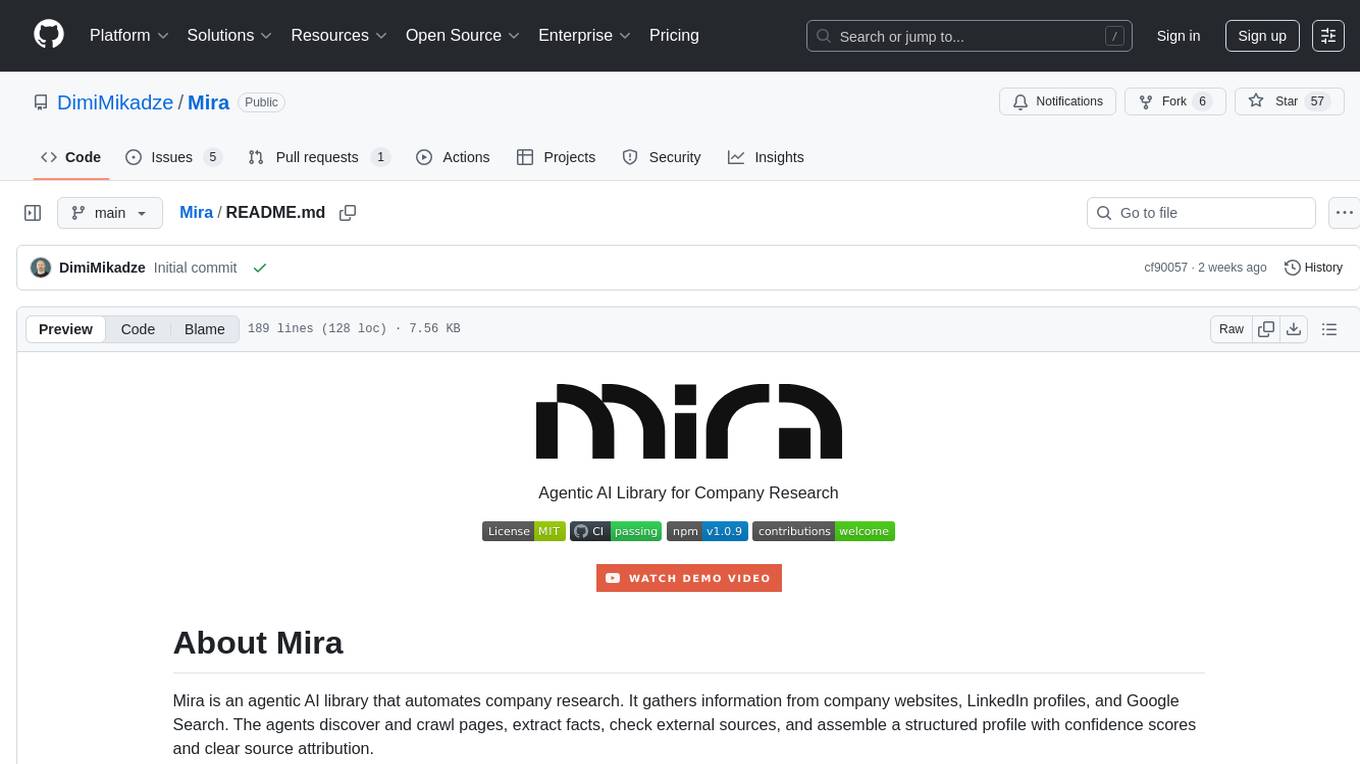
Mira
Mira is an agentic AI library designed for automating company research by gathering information from various sources like company websites, LinkedIn profiles, and Google Search. It utilizes a multi-agent architecture to collect and merge data points into a structured profile with confidence scores and clear source attribution. The core library is framework-agnostic and can be integrated into applications, pipelines, or custom workflows. Mira offers features such as real-time progress events, confidence scoring, company criteria matching, and built-in services for data gathering. The tool is suitable for users looking to streamline company research processes and enhance data collection efficiency.
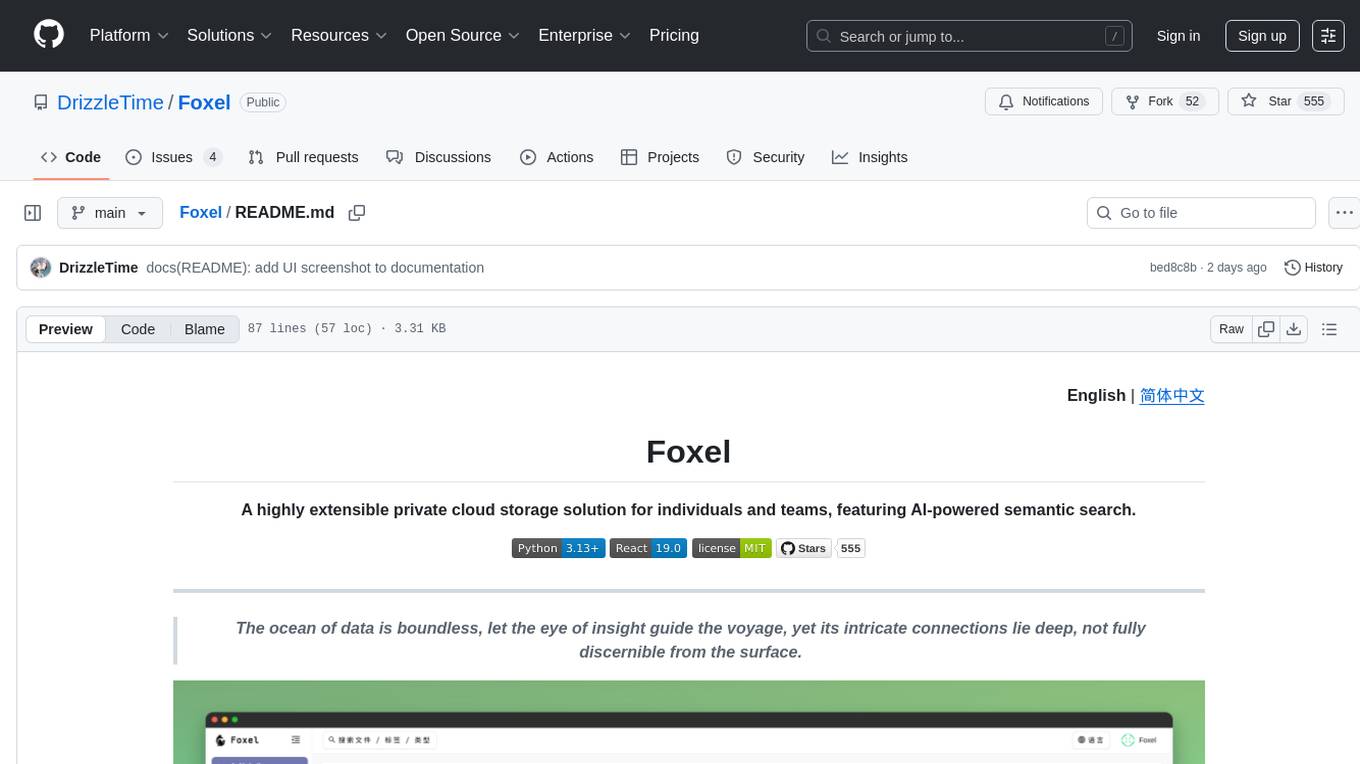
Foxel
Foxel is a highly extensible private cloud storage solution for individuals and teams, featuring AI-powered semantic search. It offers unified file management, pluggable storage backends, semantic search capabilities, built-in file preview, permissions and sharing options, and a task processing center. Users can easily manage files, search content within unstructured data, preview various file types, share files, and process tasks asynchronously. Foxel is designed to centralize file management and enhance search capabilities for users.
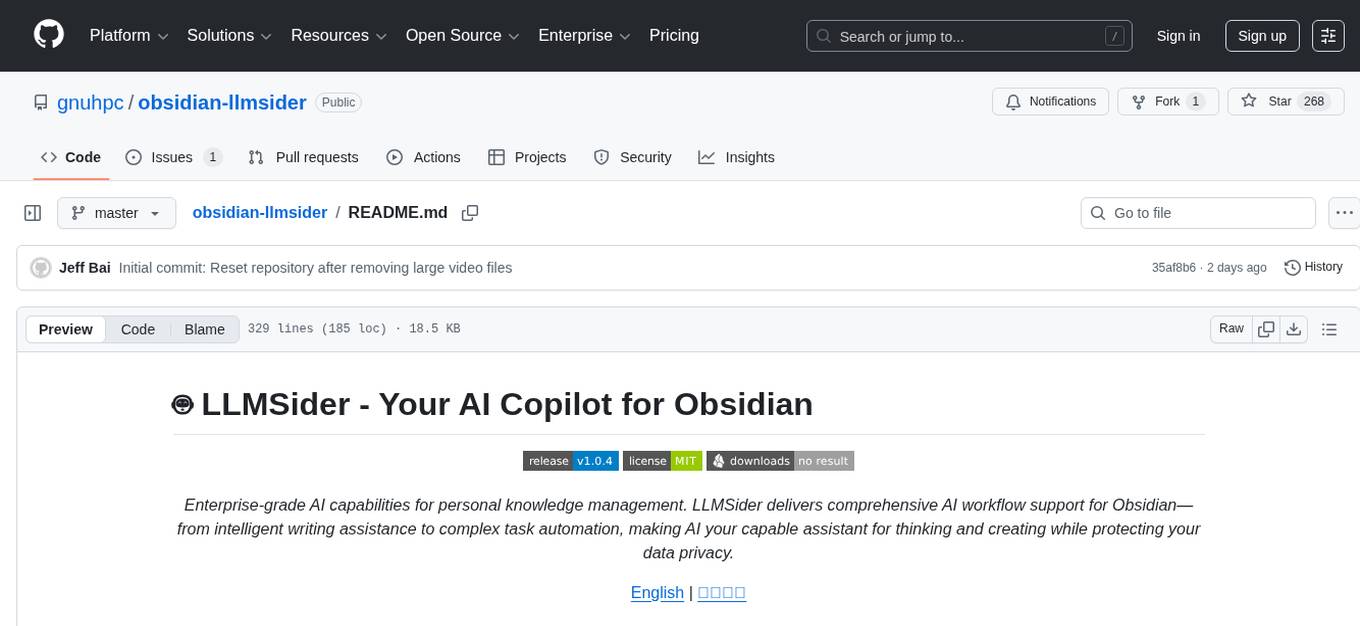
obsidian-llmsider
LLMSider is an AI assistant plugin for Obsidian that offers flexible multi-model support, deep workflow integration, privacy-first design, and a professional tool ecosystem. It provides comprehensive AI capabilities for personal knowledge management, from intelligent writing assistance to complex task automation, making AI a capable assistant for thinking and creating while ensuring data privacy.
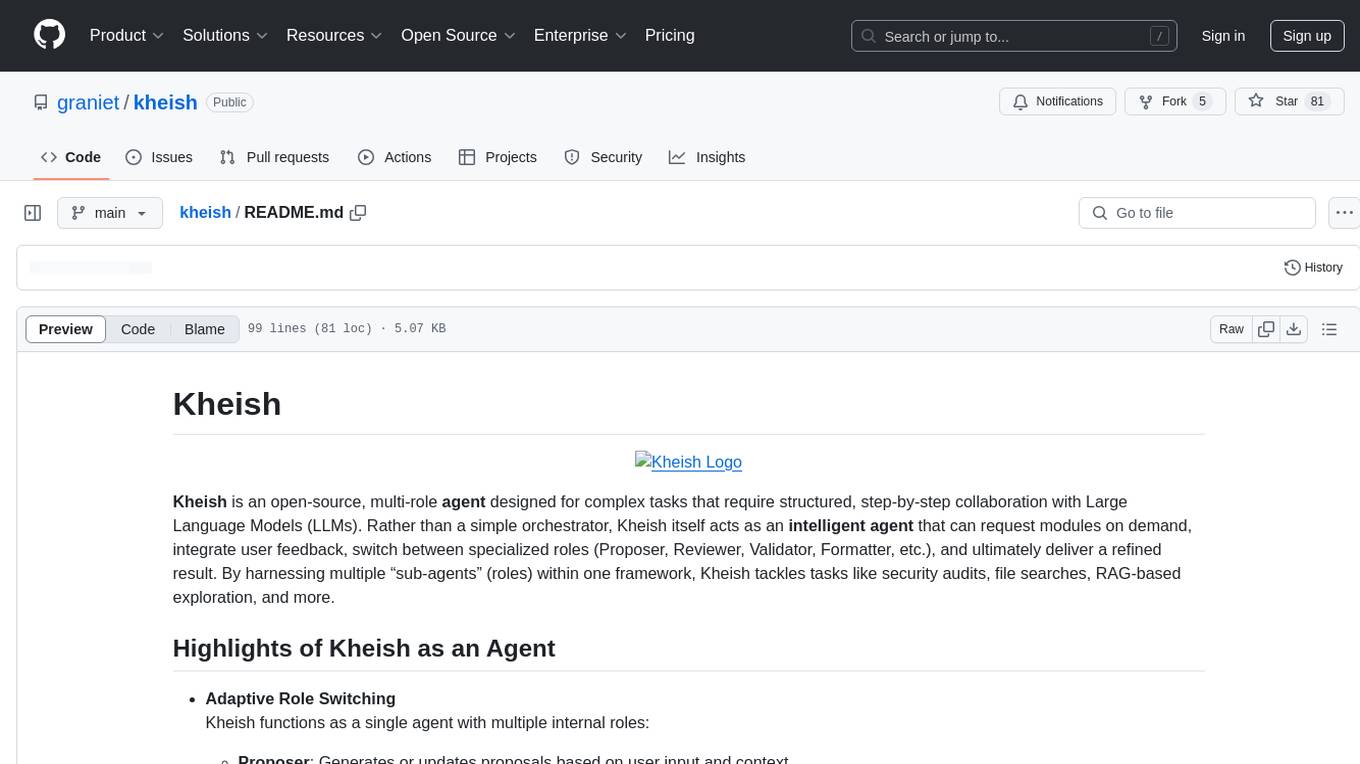
kheish
Kheish is an open-source, multi-role agent designed for complex tasks that require structured, step-by-step collaboration with Large Language Models (LLMs). It acts as an intelligent agent that can request modules on demand, integrate user feedback, switch between specialized roles, and deliver refined results. By harnessing multiple 'sub-agents' within one framework, Kheish tackles tasks like security audits, file searches, RAG-based exploration, and more.
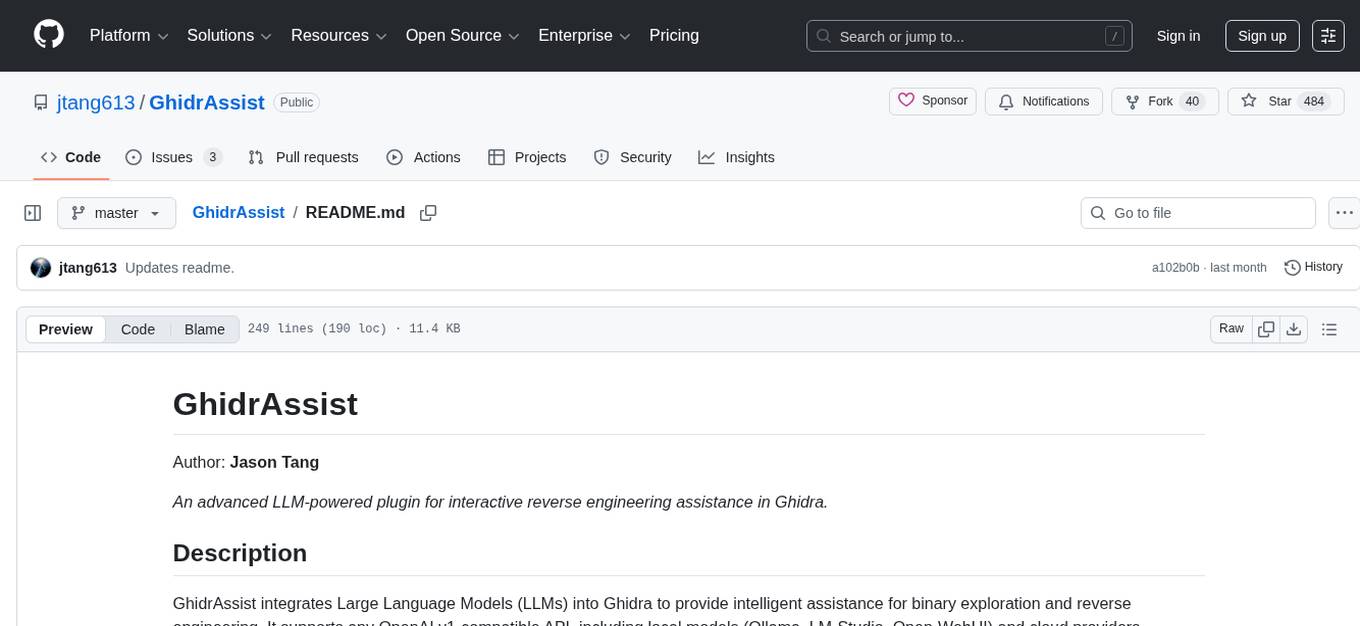
GhidrAssist
GhidrAssist is an advanced LLM-powered plugin for interactive reverse engineering assistance in Ghidra. It integrates Large Language Models (LLMs) to provide intelligent assistance for binary exploration and reverse engineering. The tool supports various OpenAI v1-compatible APIs, including local models and cloud providers. Key features include code explanation, interactive chat, custom queries, Graph-RAG knowledge system with semantic knowledge graph, community detection, security feature extraction, semantic graph tab, extended thinking/reasoning control, ReAct agentic mode, MCP integration, function calling, actions tab, RAG (Retrieval Augmented Generation), and RLHF dataset generation. The plugin uses a modular, service-oriented architecture with core services, Graph-RAG backend, data layer, and UI components.
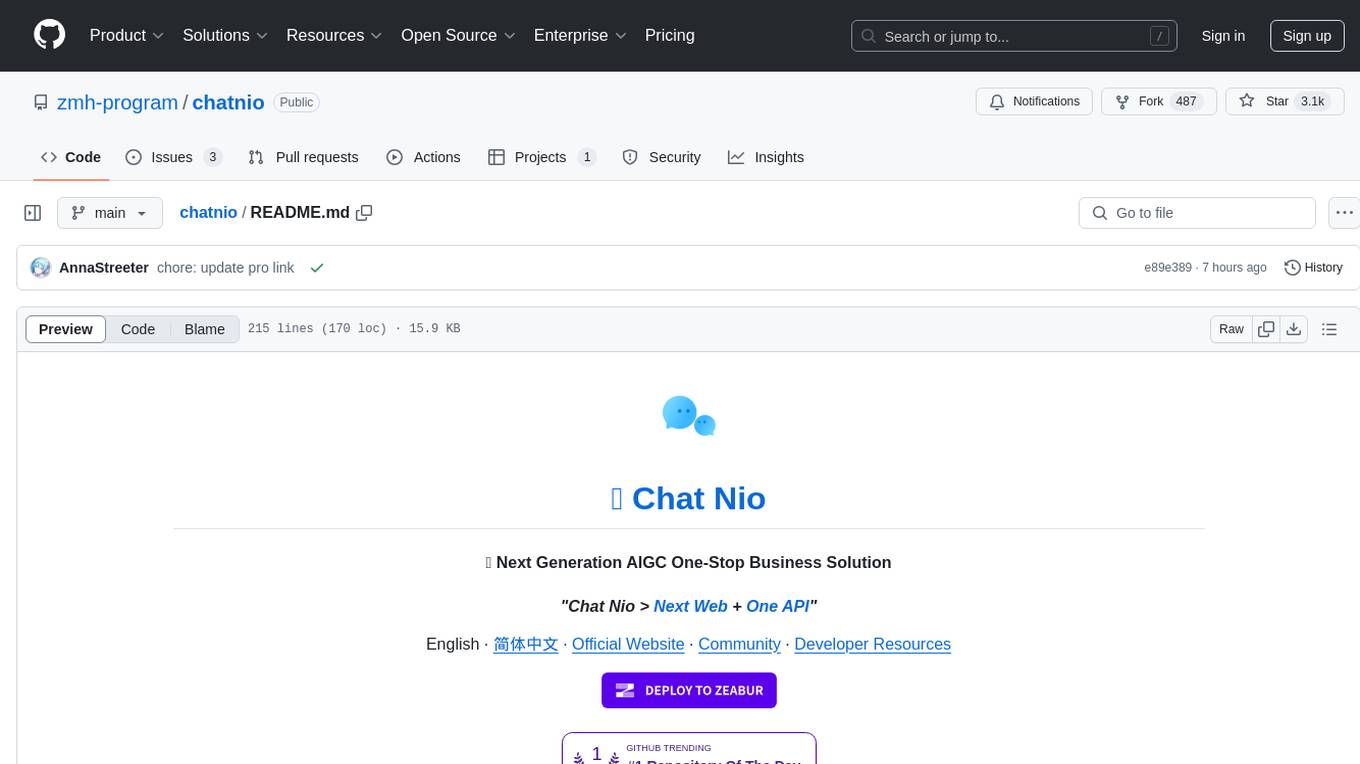
chatnio
Chat Nio is a next-generation AIGC one-stop business solution that combines the advantages of frontend-oriented lightweight deployment projects with powerful API distribution systems. It offers rich model support, beautiful UI design, complete Markdown support, multi-theme support, internationalization support, text-to-image support, powerful conversation sync, model market & preset system, rich file parsing, full model internet search, Progressive Web App (PWA) support, comprehensive backend management, multiple billing methods, innovative model caching, and additional features. The project aims to address limitations in conversation synchronization, billing, file parsing, conversation URL sharing, channel management, and API call support found in existing AIGC commercial sites, while also providing a user-friendly interface design and C-end features.
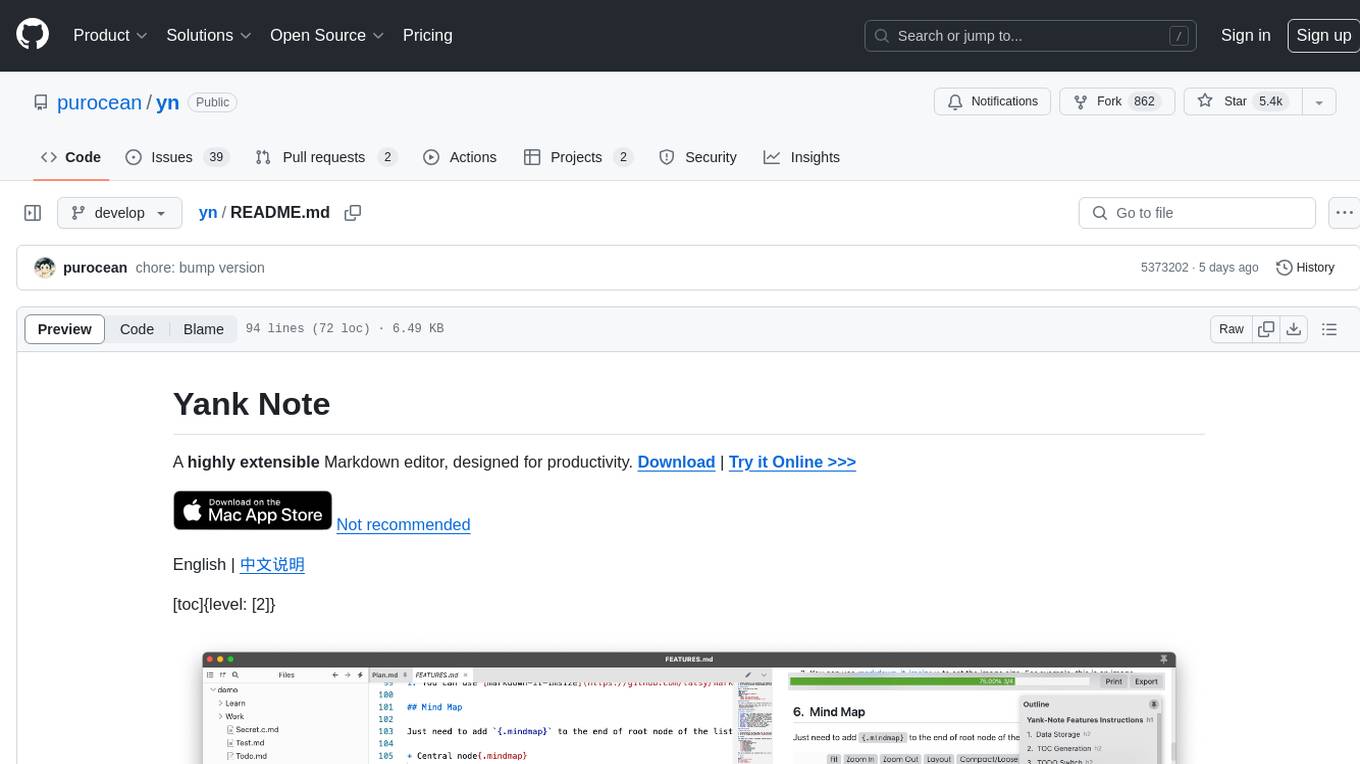
yn
Yank Note is a highly extensible Markdown editor designed for productivity. It offers features like easy-to-use interface, powerful support for version control and various embedded content, high compatibility with local Markdown files, plug-in extension support, and encryption for saving private files. Users can write their own plug-ins to expand the editor's functionality. However, for more extendability, security protection is sacrificed. The tool supports sync scrolling, outline navigation, version control, encryption, auto-save, editing assistance, image pasting, attachment embedding, code running, to-do list management, quick file opening, integrated terminal, Katex expression, GitHub-style Markdown, multiple data locations, external link conversion, HTML resolving, multiple formats export, TOC generation, table cell editing, title link copying, embedded applets, various graphics embedding, mind map display, custom container support, macro replacement, image hosting service, OpenAI auto completion, and custom plug-ins development.
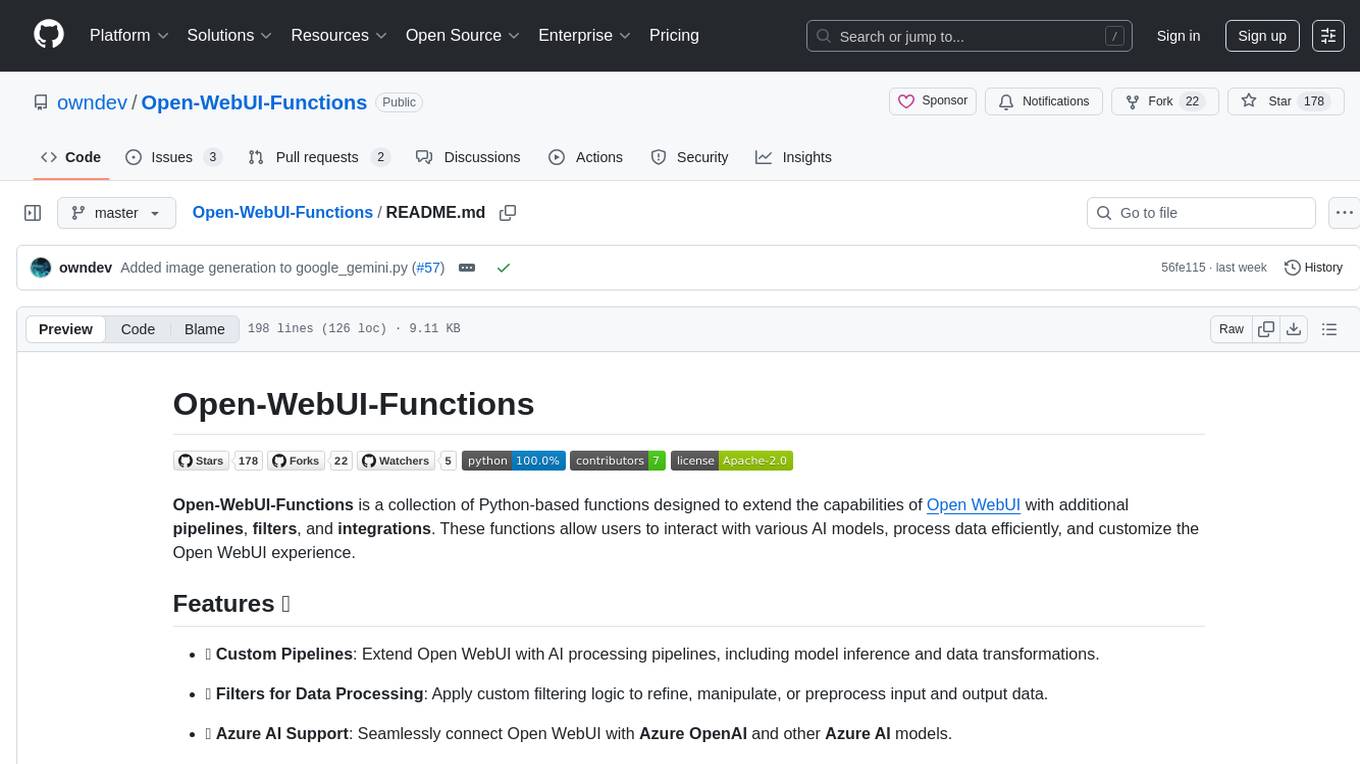
Open-WebUI-Functions
Open-WebUI-Functions is a collection of Python-based functions that extend Open WebUI with custom pipelines, filters, and integrations. Users can interact with AI models, process data efficiently, and customize the Open WebUI experience. It includes features like custom pipelines, data processing filters, Azure AI support, N8N workflow integration, flexible configuration, secure API key management, and support for both streaming and non-streaming processing. The functions require an active Open WebUI instance, may need external AI services like Azure AI, and admin access for installation. Security features include automatic encryption of sensitive information like API keys. Pipelines include Azure AI Foundry, N8N, Infomaniak, and Google Gemini. Filters like Time Token Tracker measure response time and token usage. Integrations with Azure AI, N8N, Infomaniak, and Google are supported. Contributions are welcome, and the project is licensed under Apache License 2.0.
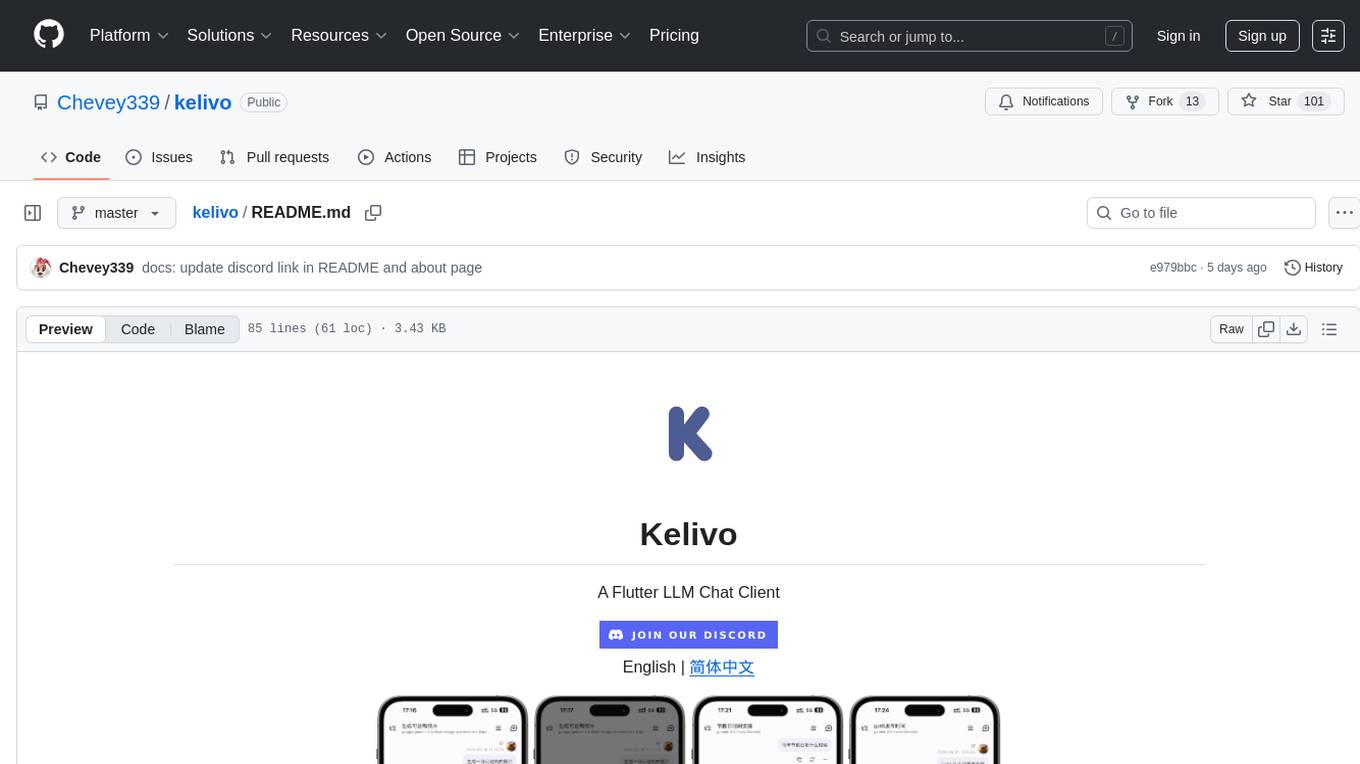
kelivo
Kelivo is a Flutter LLM Chat Client with modern design, dark mode, multi-language support, multi-provider support, custom assistants, multimodal input, markdown rendering, voice functionality, MCP support, web search integration, prompt variables, QR code sharing, data backup, and custom requests. It is built with Flutter and Dart, utilizes Provider for state management, Hive for local data storage, and supports dynamic theming and Markdown rendering. Kelivo is a versatile tool for creating and managing personalized AI assistants, supporting various input formats, and integrating with multiple search engines and AI providers.

datastoria
DataStoria is a modern, AI-powered ClickHouse management console that revolutionizes data interaction and cluster management. It offers AI-powered intelligence for natural language data exploration, smart query optimization, and intelligent visualization. Users can benefit from powerful query experience with advanced SQL editor, error diagnostics, system log inspector, and dependency graph. The tool also provides cluster monitoring and management features like multi-cluster support, multi-node dashboard, and schema explorer. Privacy and security are ensured through 100% local execution, no data collection, and BYO API key. DataStoria enhances ClickHouse experience by combining data with intelligence.
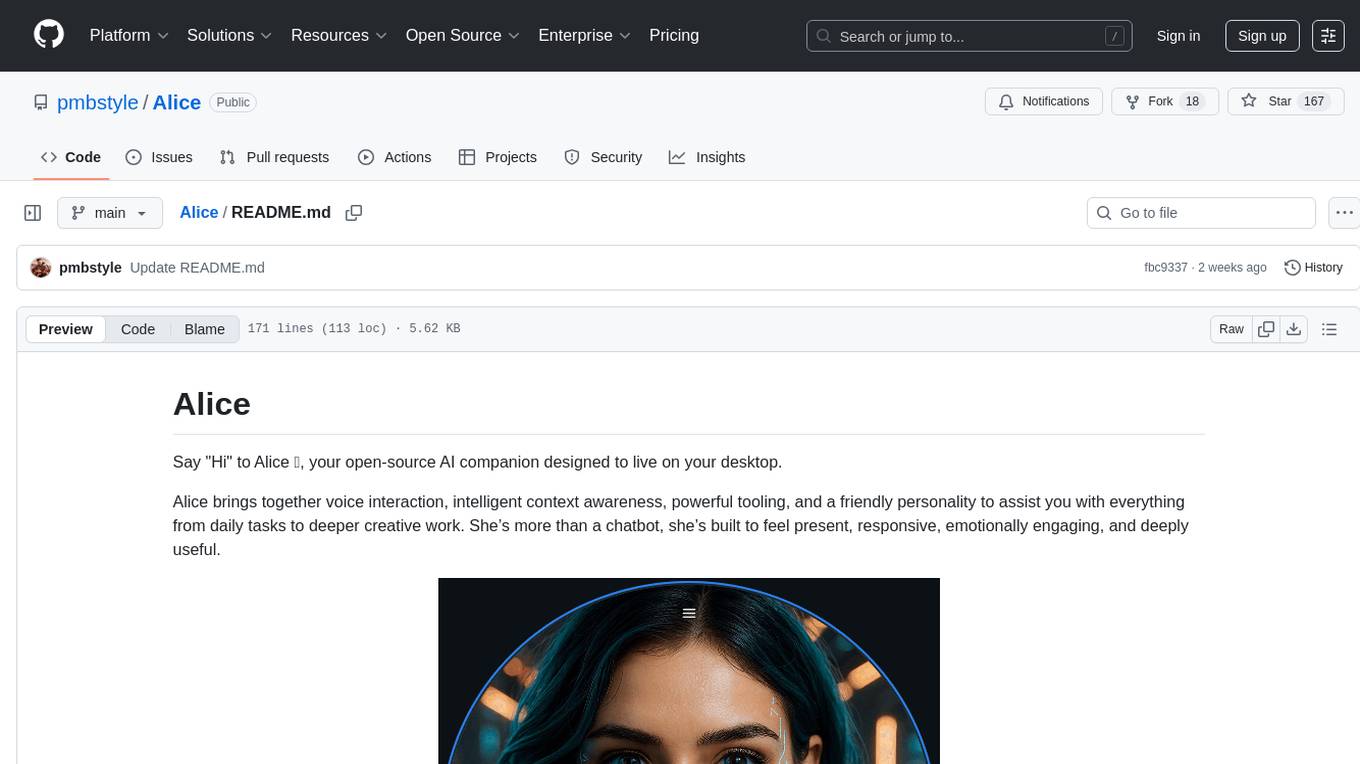
Alice
Alice is an open-source AI companion designed to live on your desktop, providing voice interaction, intelligent context awareness, and powerful tooling. More than a chatbot, Alice is emotionally engaging and deeply useful, assisting with daily tasks and creative work. Key features include voice interaction with natural-sounding responses, memory and context management, vision and visual output capabilities, computer use tools, function calling for web search and task scheduling, wake word support, dedicated Chrome extension, and flexible settings interface. Technologies used include Vue.js, Electron, OpenAI, Go, hnswlib-node, and more. Alice is customizable and offers a dedicated Chrome extension, wake word support, and various tools for computer use and productivity tasks.

griptape
Griptape is a modular Python framework for building AI-powered applications that securely connect to your enterprise data and APIs. It offers developers the ability to maintain control and flexibility at every step. Griptape's core components include Structures (Agents, Pipelines, and Workflows), Tasks, Tools, Memory (Conversation Memory, Task Memory, and Meta Memory), Drivers (Prompt and Embedding Drivers, Vector Store Drivers, Image Generation Drivers, Image Query Drivers, SQL Drivers, Web Scraper Drivers, and Conversation Memory Drivers), Engines (Query Engines, Extraction Engines, Summary Engines, Image Generation Engines, and Image Query Engines), and additional components (Rulesets, Loaders, Artifacts, Chunkers, and Tokenizers). Griptape enables developers to create AI-powered applications with ease and efficiency.
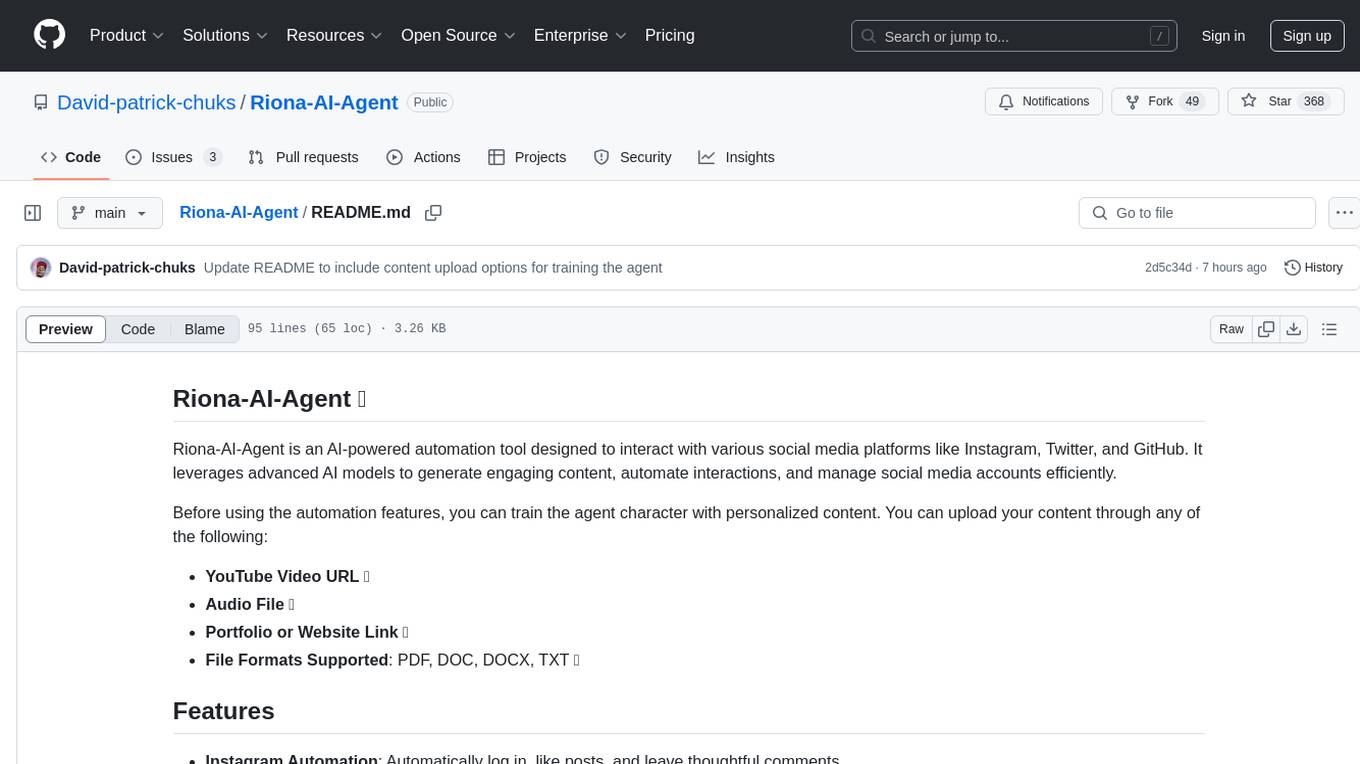
Riona-AI-Agent
Riona-AI-Agent is a versatile AI chatbot designed to assist users in various tasks. It utilizes natural language processing and machine learning algorithms to understand user queries and provide accurate responses. The chatbot can be integrated into websites, applications, and messaging platforms to enhance user experience and streamline communication. With its customizable features and easy deployment, Riona-AI-Agent is suitable for businesses, developers, and individuals looking to automate customer support, provide information, and engage with users in a conversational manner.
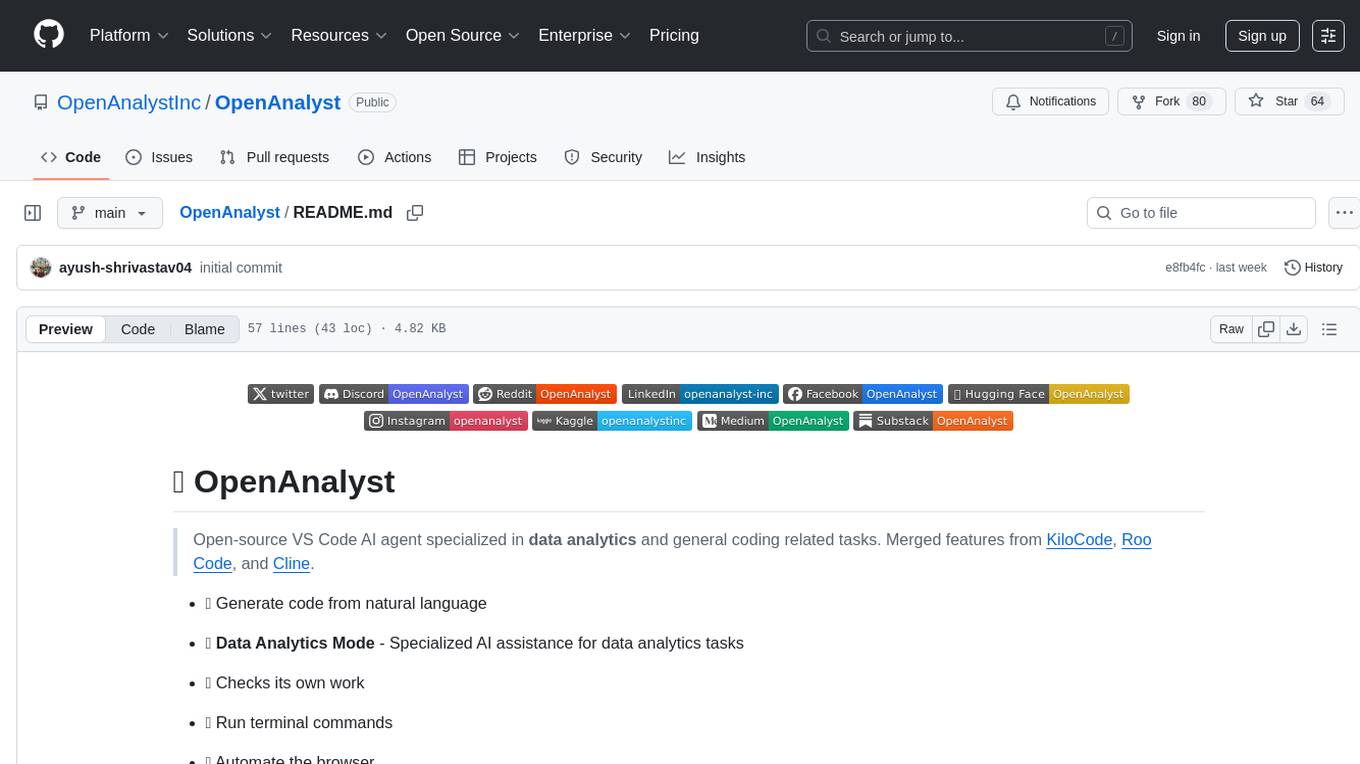
OpenAnalyst
OpenAnalyst is an open-source VS Code AI agent specialized in data analytics and general coding tasks. It merges features from KiloCode, Roo Code, and Cline, offering code generation from natural language, data analytics mode, self-checking, terminal command running, browser automation, latest AI models, and API keys option. It supports multi-mode operation for roles like Data Analyst, Code, Ask, and Debug. OpenAnalyst is a fork of KiloCode, combining the best features from Cline, Roo Code, and KiloCode, with enhancements like MCP Server Marketplace, automated refactoring, and support for latest AI models.
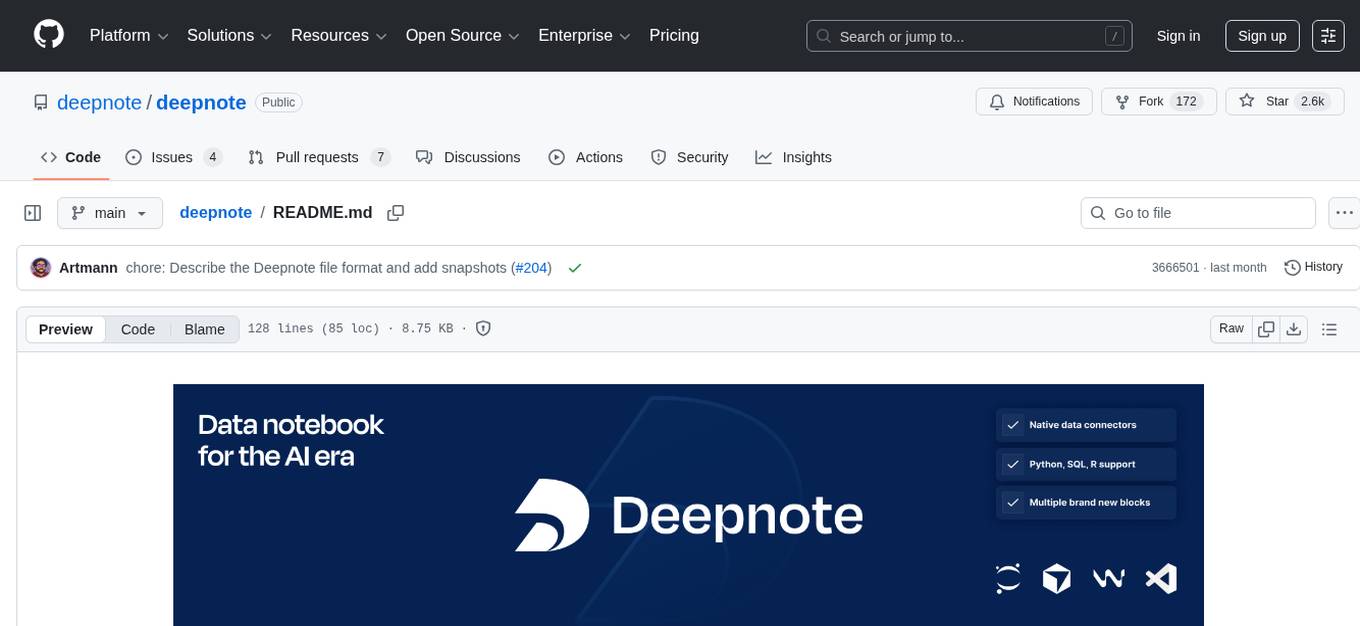
deepnote
Deepnote is a data notebook tool designed for the AI era, used by over 500,000 data professionals at companies like Estée Lauder, SoundCloud, Statsig, and Gusto. It offers a human-readable format, block-based architecture, reactive notebook execution, and effortless conversion between .ipynb and .deepnote formats. Deepnote extends Jupyter with features like native AI agent, Git integration, cloud compute, and native database & API connections. The repository contains reusable packages and libraries for Deepnote's notebook, runtime, and collaboration features.
For similar tasks

simplechat
The Simple Chat Application is a web-based platform that facilitates secure interactions with generative AI models, leveraging Azure OpenAI. It features Retrieval-Augmented Generation (RAG) for grounding conversations in user data. Users can upload personal or group documents processed using Azure AI Document Intelligence and Azure OpenAI Embeddings. The application offers optional features like Content Safety, Image Generation, Video and Audio processing, Document Classification, User Feedback, Conversation Archiving, Metadata Extraction, and Enhanced Citations. It uses Azure Cosmos DB for storage, Azure Active Directory for authentication, and runs on Azure App Service. Suitable for enterprise use, it supports knowledge discovery, content generation, and collaborative AI tasks in a secure, Azure-native framework.

h2ogpt
h2oGPT is an Apache V2 open-source project that allows users to query and summarize documents or chat with local private GPT LLMs. It features a private offline database of any documents (PDFs, Excel, Word, Images, Video Frames, Youtube, Audio, Code, Text, MarkDown, etc.), a persistent database (Chroma, Weaviate, or in-memory FAISS) using accurate embeddings (instructor-large, all-MiniLM-L6-v2, etc.), and efficient use of context using instruct-tuned LLMs (no need for LangChain's few-shot approach). h2oGPT also offers parallel summarization and extraction, reaching an output of 80 tokens per second with the 13B LLaMa2 model, HYDE (Hypothetical Document Embeddings) for enhanced retrieval based upon LLM responses, a variety of models supported (LLaMa2, Mistral, Falcon, Vicuna, WizardLM. With AutoGPTQ, 4-bit/8-bit, LORA, etc.), GPU support from HF and LLaMa.cpp GGML models, and CPU support using HF, LLaMa.cpp, and GPT4ALL models. Additionally, h2oGPT provides Attention Sinks for arbitrarily long generation (LLaMa-2, Mistral, MPT, Pythia, Falcon, etc.), a UI or CLI with streaming of all models, the ability to upload and view documents through the UI (control multiple collaborative or personal collections), Vision Models LLaVa, Claude-3, Gemini-Pro-Vision, GPT-4-Vision, Image Generation Stable Diffusion (sdxl-turbo, sdxl) and PlaygroundAI (playv2), Voice STT using Whisper with streaming audio conversion, Voice TTS using MIT-Licensed Microsoft Speech T5 with multiple voices and Streaming audio conversion, Voice TTS using MPL2-Licensed TTS including Voice Cloning and Streaming audio conversion, AI Assistant Voice Control Mode for hands-free control of h2oGPT chat, Bake-off UI mode against many models at the same time, Easy Download of model artifacts and control over models like LLaMa.cpp through the UI, Authentication in the UI by user/password via Native or Google OAuth, State Preservation in the UI by user/password, Linux, Docker, macOS, and Windows support, Easy Windows Installer for Windows 10 64-bit (CPU/CUDA), Easy macOS Installer for macOS (CPU/M1/M2), Inference Servers support (oLLaMa, HF TGI server, vLLM, Gradio, ExLLaMa, Replicate, OpenAI, Azure OpenAI, Anthropic), OpenAI-compliant, Server Proxy API (h2oGPT acts as drop-in-replacement to OpenAI server), Python client API (to talk to Gradio server), JSON Mode with any model via code block extraction. Also supports MistralAI JSON mode, Claude-3 via function calling with strict Schema, OpenAI via JSON mode, and vLLM via guided_json with strict Schema, Web-Search integration with Chat and Document Q/A, Agents for Search, Document Q/A, Python Code, CSV frames (Experimental, best with OpenAI currently), Evaluate performance using reward models, and Quality maintained with over 1000 unit and integration tests taking over 4 GPU-hours.

serverless-chat-langchainjs
This sample shows how to build a serverless chat experience with Retrieval-Augmented Generation using LangChain.js and Azure. The application is hosted on Azure Static Web Apps and Azure Functions, with Azure Cosmos DB for MongoDB vCore as the vector database. You can use it as a starting point for building more complex AI applications.

react-native-vercel-ai
Run Vercel AI package on React Native, Expo, Web and Universal apps. Currently React Native fetch API does not support streaming which is used as a default on Vercel AI. This package enables you to use AI library on React Native but the best usage is when used on Expo universal native apps. On mobile you get back responses without streaming with the same API of `useChat` and `useCompletion` and on web it will fallback to `ai/react`

LLamaSharp
LLamaSharp is a cross-platform library to run 🦙LLaMA/LLaVA model (and others) on your local device. Based on llama.cpp, inference with LLamaSharp is efficient on both CPU and GPU. With the higher-level APIs and RAG support, it's convenient to deploy LLM (Large Language Model) in your application with LLamaSharp.

gpt4all
GPT4All is an ecosystem to run powerful and customized large language models that work locally on consumer grade CPUs and any GPU. Note that your CPU needs to support AVX or AVX2 instructions. Learn more in the documentation. A GPT4All model is a 3GB - 8GB file that you can download and plug into the GPT4All open-source ecosystem software. Nomic AI supports and maintains this software ecosystem to enforce quality and security alongside spearheading the effort to allow any person or enterprise to easily train and deploy their own on-edge large language models.

ChatGPT-Telegram-Bot
ChatGPT Telegram Bot is a Telegram bot that provides a smooth AI experience. It supports both Azure OpenAI and native OpenAI, and offers real-time (streaming) response to AI, with a faster and smoother experience. The bot also has 15 preset bot identities that can be quickly switched, and supports custom bot identities to meet personalized needs. Additionally, it supports clearing the contents of the chat with a single click, and restarting the conversation at any time. The bot also supports native Telegram bot button support, making it easy and intuitive to implement required functions. User level division is also supported, with different levels enjoying different single session token numbers, context numbers, and session frequencies. The bot supports English and Chinese on UI, and is containerized for easy deployment.

twinny
Twinny is a free and open-source AI code completion plugin for Visual Studio Code and compatible editors. It integrates with various tools and frameworks, including Ollama, llama.cpp, oobabooga/text-generation-webui, LM Studio, LiteLLM, and Open WebUI. Twinny offers features such as fill-in-the-middle code completion, chat with AI about your code, customizable API endpoints, and support for single or multiline fill-in-middle completions. It is easy to install via the Visual Studio Code extensions marketplace and provides a range of customization options. Twinny supports both online and offline operation and conforms to the OpenAI API standard.
For similar jobs

sweep
Sweep is an AI junior developer that turns bugs and feature requests into code changes. It automatically handles developer experience improvements like adding type hints and improving test coverage.

teams-ai
The Teams AI Library is a software development kit (SDK) that helps developers create bots that can interact with Teams and Microsoft 365 applications. It is built on top of the Bot Framework SDK and simplifies the process of developing bots that interact with Teams' artificial intelligence capabilities. The SDK is available for JavaScript/TypeScript, .NET, and Python.

ai-guide
This guide is dedicated to Large Language Models (LLMs) that you can run on your home computer. It assumes your PC is a lower-end, non-gaming setup.

classifai
Supercharge WordPress Content Workflows and Engagement with Artificial Intelligence. Tap into leading cloud-based services like OpenAI, Microsoft Azure AI, Google Gemini and IBM Watson to augment your WordPress-powered websites. Publish content faster while improving SEO performance and increasing audience engagement. ClassifAI integrates Artificial Intelligence and Machine Learning technologies to lighten your workload and eliminate tedious tasks, giving you more time to create original content that matters.

chatbot-ui
Chatbot UI is an open-source AI chat app that allows users to create and deploy their own AI chatbots. It is easy to use and can be customized to fit any need. Chatbot UI is perfect for businesses, developers, and anyone who wants to create a chatbot.

BricksLLM
BricksLLM is a cloud native AI gateway written in Go. Currently, it provides native support for OpenAI, Anthropic, Azure OpenAI and vLLM. BricksLLM aims to provide enterprise level infrastructure that can power any LLM production use cases. Here are some use cases for BricksLLM: * Set LLM usage limits for users on different pricing tiers * Track LLM usage on a per user and per organization basis * Block or redact requests containing PIIs * Improve LLM reliability with failovers, retries and caching * Distribute API keys with rate limits and cost limits for internal development/production use cases * Distribute API keys with rate limits and cost limits for students

uAgents
uAgents is a Python library developed by Fetch.ai that allows for the creation of autonomous AI agents. These agents can perform various tasks on a schedule or take action on various events. uAgents are easy to create and manage, and they are connected to a fast-growing network of other uAgents. They are also secure, with cryptographically secured messages and wallets.

griptape
Griptape is a modular Python framework for building AI-powered applications that securely connect to your enterprise data and APIs. It offers developers the ability to maintain control and flexibility at every step. Griptape's core components include Structures (Agents, Pipelines, and Workflows), Tasks, Tools, Memory (Conversation Memory, Task Memory, and Meta Memory), Drivers (Prompt and Embedding Drivers, Vector Store Drivers, Image Generation Drivers, Image Query Drivers, SQL Drivers, Web Scraper Drivers, and Conversation Memory Drivers), Engines (Query Engines, Extraction Engines, Summary Engines, Image Generation Engines, and Image Query Engines), and additional components (Rulesets, Loaders, Artifacts, Chunkers, and Tokenizers). Griptape enables developers to create AI-powered applications with ease and efficiency.



